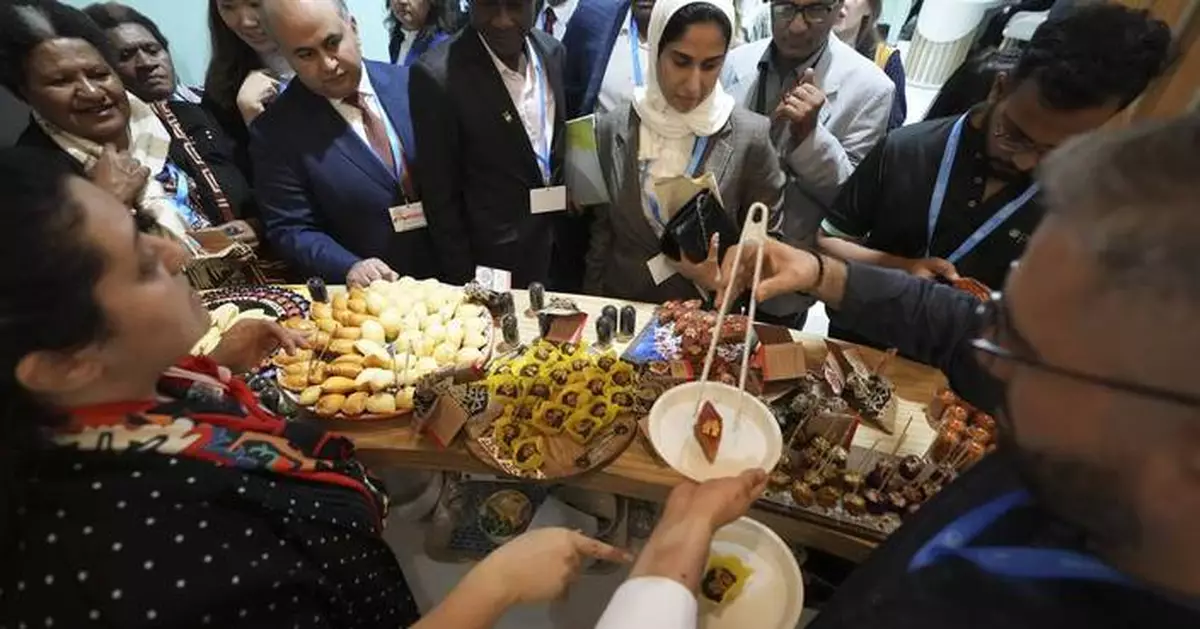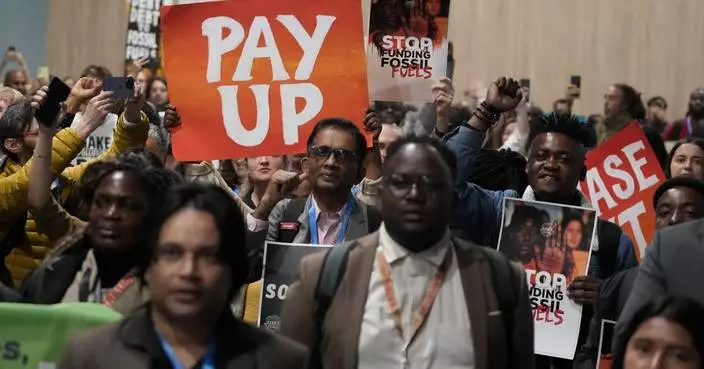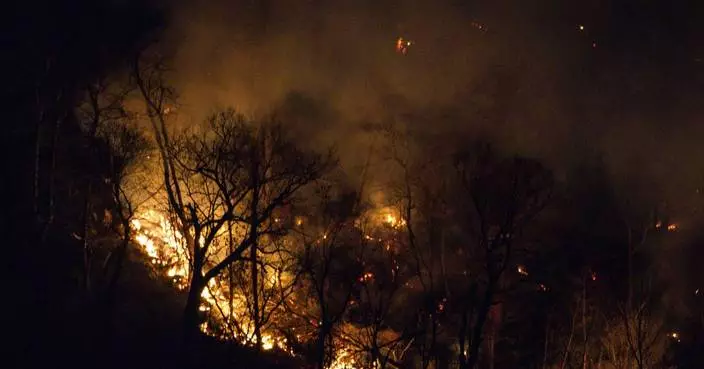BAKU, Azerbaijan (AP) — Agreements might not yet be brewing amongst negotiators at United Nations climate talks, but tea certainly is.
It's one of the clearest reminders that the climate summit — COP29 — is hosted by Azerbaijan. Attendees who roam for miles within the indoor venue have ample options to take a pit stop for sugar and caffeine: shops stack high mountains of pastries with sugary, nutty pakhlava and cardamom-tinged, crescent-shaped shekerbura. At Azerbaijan's country pavilion, women in Baku's traditional dress pour the warm drink for visitors.
All of it, like daily life in the city outside, revolves around tea — which climate change threatens around the globe. As world leaders descend on the capital city of Baku for climate talks, researchers who study tea report that in some regions around the world, tea cultivation could decrease by over half as rising temperatures, drought, heavy precipitation and erosion batter tea plants and the land they grow on. Scientists are studying ways to improve tea varieties and preparing for a future where some tea production moves north, along with many other crops hard hit by climate change.
Tea "is a source of livelihood for our region; especially for the local people, for tea producers," said Keziban Yazici, a professor who has been studying the effects of climate change on tea, speaking in Turkish. “We need to take the necessary precautions against climate change to make this product sustainable."
Her team has been working on developing drought-resistant tea varieties at their university in Rize, Turkey, one of the major tea-producing areas in the Caucasus region. Yazici traveled to Azerbaijan this spring to initiate further cooperation between the countries — which have many similarities in tea culture and growing — on preparing tea crops for the threat of climate change.
The perilous future of this beloved drink serves as a reminder that if the world fails to meet the global warming goals set in the Paris Agreement, many places around the world stand to grieve not just lives and livelihoods, but also treasured elements of cultural heritage.
“Culture and the future has to be aligned," said Fatima Fataliyeva, the senior sustainability manager for the COP29 operation company, who was responsible for the design of the Azerbaijan pavilion at the venue. “My mom taught me this, so I will (teach) my kids, so it doesn't disappear.”
Fataliyeva described the importance for her team of including Azerbaijani culture at the venue. The first thing that comes to your attention, she said, is tea.
From an early age, she learned that drinking tea symbolized hospitality and respect. Tea is for drinking with family and friends, in the home and out on dates. It's central in gossiping and matchmaking, for grandpas playing chess, on festivals and in times of mourning. People drink it from pear-shaped glasses called armudu that keep the bottom of the tea warm while cooling the top, sometimes served with a wedge of orange or lemon and a lump of boiled sugar.
“When you are happy, you drink tea. When you are sad, you drink tea,” said Levent Kurnaz, a professor who studies climate change and ways of combatting invasive pests that are likely to cause increasing harm to tea plants.
Kurnaz attended COP29 in part because he saw it as an important way to communicate about climate change — a topic he says isn't talked about as widely in Turkey and Azerbaijan but that is already slamming the few subject-matter experts in the region with a vast array of problems, present and future, in fields ranging from agriculture to immigration.
“Climate change will affect this region seriously,” Kurnaz said, especially for farmers, many of them women, who have grown tea all their lives. “They don’t have a clue what to do when tea production goes sour. But at some point it will."
Azerbaijan is 25th on the list of top crude oil exporting countries and one of the birthplaces of the oil industry, one of leading sources of planet-warming carbon dioxide emissions. The country is planning to hike its fossil fuel production over the next decade to meet demand from Europe, and their oil production has been a point of controversy since the beginning of this COP.
But President Ilham Aliyev said earlier this year that the country is an phase of transition toward clean energy, while maintaining the world continues to need fossil fuels to develop in the foreseeable future.
For ordinary people as well as producers, climate change and choices about food and drink are intertwined. That's evident to Rauf Shikhaliyev, who owns a vegetarian and vegan restaurant in Baku called De Rama, also included in the COP29 venue food court. He felt it was “very important to participate" at the climate talks because his project of creating a vegetarian restaurant was “highly linked to climate change,” he said.
He added that after years in the restaurant business, he's seen the tea culture firsthand: before they order food, many locals will first order tea.
It's fitting for the U.N.: “Tea drinking makes people get kind of united,” he said.
Frazer reported from Ankara, Turkey.
Follow Melina Walling on X, formerly known as Twitter, @MelinaWalling.
The Associated Press’ climate and environmental coverage receives financial support from multiple private foundations. AP is solely responsible for all content. Find AP’s standards for working with philanthropies, a list of supporters and funded coverage areas at AP.org.

Tea is served at the Azerbaijan Pavilion at the COP29 U.N. Climate Summit, Wednesday, Nov. 13, 2024, in Baku, Azerbaijan. (AP Photo/Peter Dejong)

Tea is served at the Azerbaijan Pavilion during the COP29 U.N. Climate Summit, Wednesday, Nov. 13, 2024, in Baku, Azerbaijan. (AP Photo/Peter Dejong)
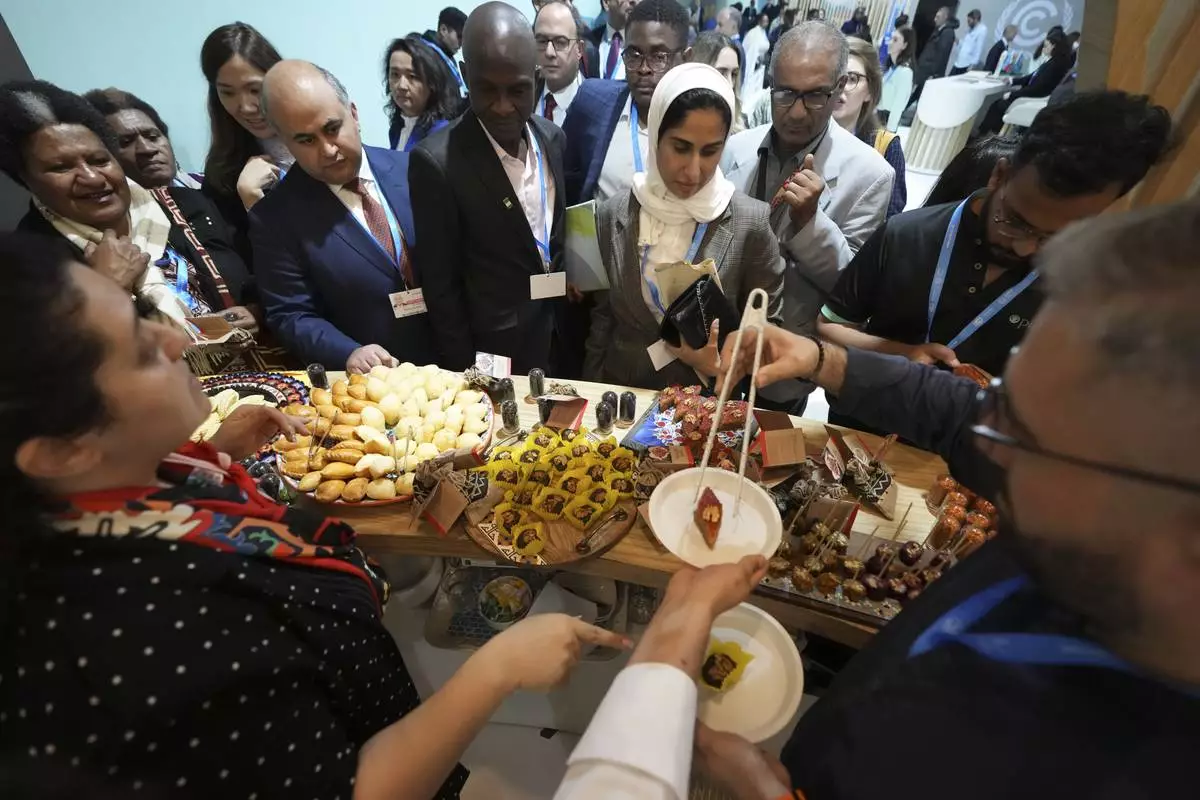
Attendees get food at the Azerbaijan Pavilion during COP29 U.N. Climate Summit, Thursday, Nov. 14, 2024, in Baku, Azerbaijan. (AP Photo/Sergei Grits)
TEL AVIV, Israel (AP) — Israeli strikes in the Gaza Strip overnight killed 12 people, Palestinian medical officials said Sunday. Israeli police meanwhile arrested three suspects after flares were fired at Prime Minister Benjamin Netanyahu's private residence in the coastal city of Caesarea.
In Lebanon, Israeli warplanes pounded the southern suburbs of Beirut after the military warned people to evacuate from at least seven buildings. The Hezbollah militant group has a strong presence in the area, known as the Dahiyeh, and the strikes came as Lebanese officials are considering a United States-brokered cease-fire proposal.
Netanyahu and his family were not at the residence when two flares were fired at it overnight, and there were no injuries, authorities said. A drone launched by Hezbollah struck the residence last month, also when Netanyahu and his family were away.
The police did not provide details about the suspects behind the flares, but officials pointed to domestic political critics of Netanyahu. Israel's largely ceremonial president, Isaac Herzog, condemned the incident and warned against “an escalation of the violence in the public sphere.”
Netanyahu has faced months of mass protests over his handling of the hostage crisis unleashed by Hamas' Oct. 7, 2023 attack into Israel, which ignited the ongoing war in Gaza.
Critics blame Netanyahu for the security and intelligence failures that allowed the attack to happen and for not reaching a deal with Hamas to release scores of hostages still held inside Gaza. Israelis rallied again in Tel Aviv on Saturday night to demand a cease-fire deal to return them.
Justice Minister Yariv Levin meanwhile seized on the flare attack to call for a revival of his plans to overhaul the Israeli judiciary, which had sparked months of mass protests before the war.
“The time has come to provide full support for the restoration of the justice system and the law enforcement systems, and to put an end to anarchy, rampage, refusal, and attempts to harm the Prime Minister," he said in a statement.
Supporters said the judiciary changes aim to strengthen democracy by circumscribing the authority of unelected judges and turning over more powers to elected officials. Opponents see the overhaul as a power grab by Netanyahu, who is on trial for corruption charges, and an assault on a key watchdog.
Opposition Leader Yair Lapid said in a post on X that he “strongly condemns” the firing of flares at Netanyahu’s home while blasting Levin’s proposal.
“Levin should go home with rest of this irresponsible government,” Lapid wrote. “We will not let him turn Israel into an undemocratic state.”
Israeli strikes killed six people in Nuseirat and another four in Bureij, two built-up refugee camps in central Gaza dating back to the 1948 war surrounding Israel’s creation.
Another two people were killed in a strike on Gaza’s main north-south highway, according to the Al-Aqsa Martyrs Hospital in the central city of Deir al-Balah, which received all 12 bodies.
The war between Israel and Hamas began after Palestinian militants stormed into Israel on Oct. 7, 2023, killing about 1,200 people — mostly civilians — and abducting 250 others. Around 100 hostages are still inside Gaza, about a third of them believed to be dead.
The Health Ministry in Gaza says around 43,800 Palestinians have been killed in the war. The ministry does not distinguish between civilians and combatants but has said women and children make up more than half the fatalities. Around 90% of Gaza's population of 2.3 million Palestinians have been displaced, and large areas of the territory have been flattened by Israeli bombardment and ground operations.
The Israeli military posted evacuation warnings on X about an hour before the strikes on southern Beirut, which came early Sunday. Local media reported church bells ringing in and around the area to alert residents. There were no immediate reports of casualties.
The Israeli military also renewed calls on Sunday for residents in over a dozen villages in southern Lebanon to flee as ground troops pushed farther north.
Hezbollah began firing rockets, missiles and drones into Israel the day after Hamas’ 2023 attack, drawing retaliatory airstrikes. The conflict steadily escalated and erupted into all-out war in September. Israeli forces invaded Lebanon on Oct. 1.
More than 3,400 people have been killed in Lebanon, according to the country’s Health Ministry, and over 1.2 million driven from their homes. It is not known how many of the dead are Hezbollah fighters.
On the Israeli side, Hezbollah’s aerial attacks have killed at least 76 people, including 31 soldiers, and caused some 60,000 people to flee from communities in the north.
Shurafa reported from Deir al-Balah, Gaza Strip, and Chehayeb from Beirut.
Find more of AP’s war coverage at https://apnews.com/hub/israel-hamas-war
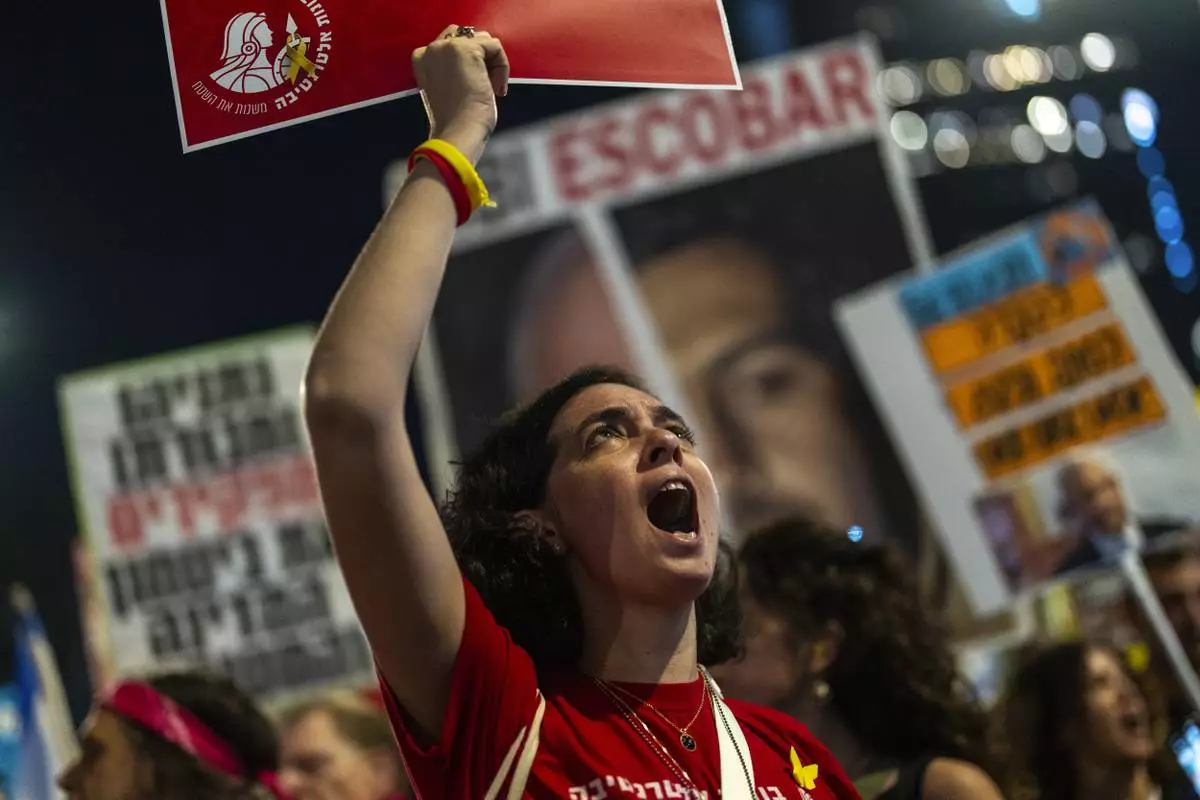
A woman shouts slogans during a protest against Prime Minister Benjamin Netanyahu's government and call for the release of hostages held in the Gaza Strip by the Hamas militant group, in Tel Aviv, Israel, Saturday, Nov. 16, 2024. (AP Photo/Francisco Seco)
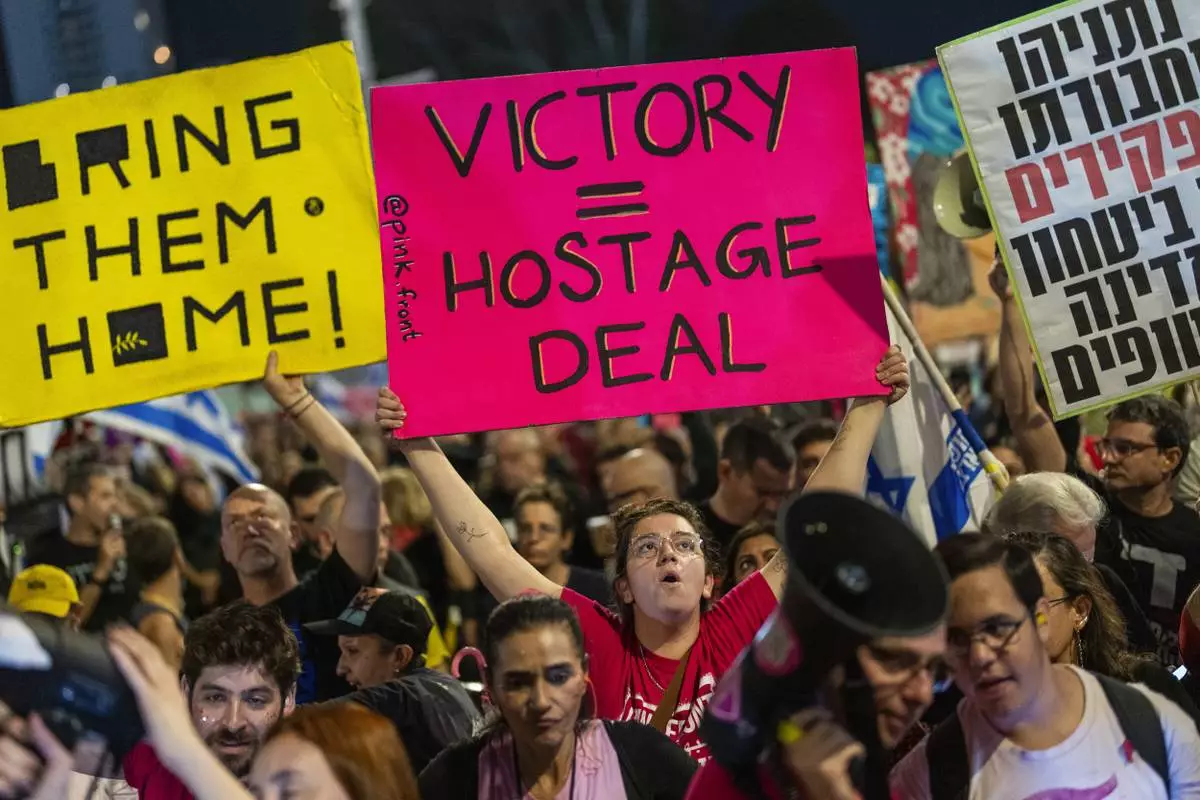
People shout slogans during a protest against Prime Minister Benjamin Netanyahu's government and call for the release of hostages held in the Gaza Strip by the Hamas militant group, in Tel Aviv, Israel, Saturday, Nov. 16, 2024. (AP Photo/Francisco Seco)
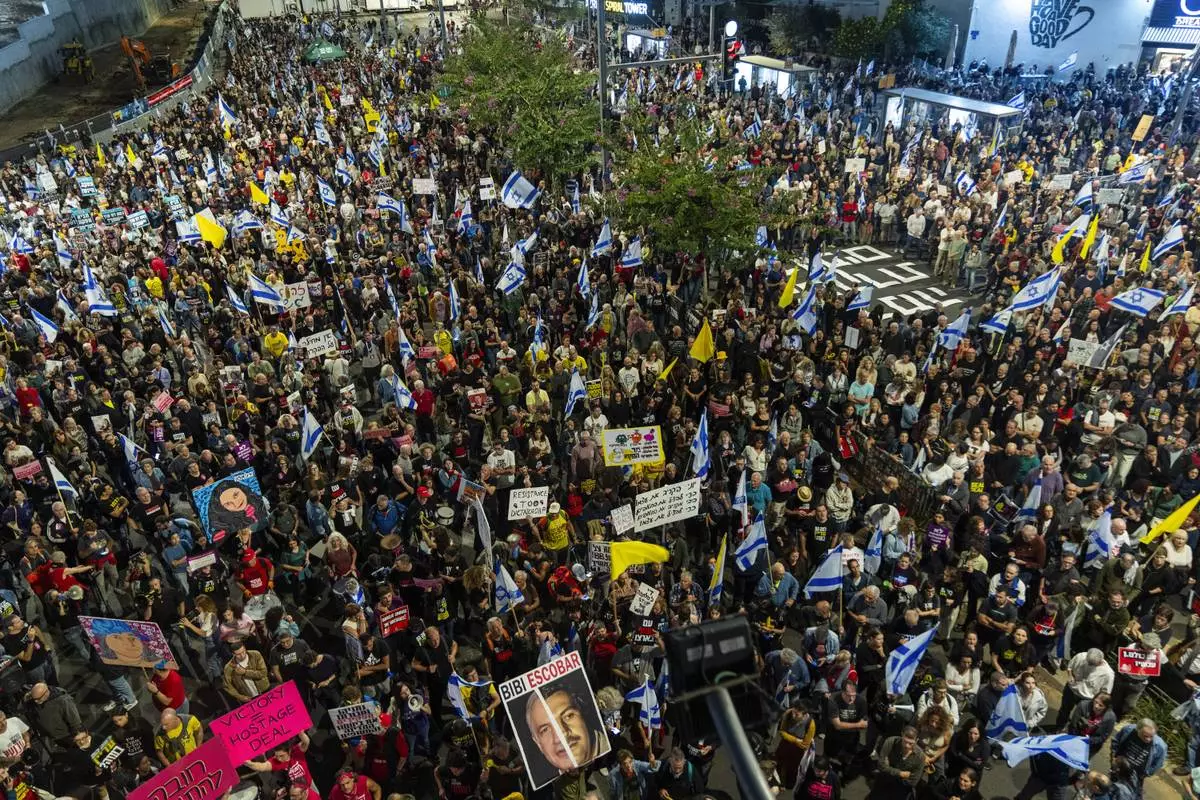
People gather to protest against Prime Minister Benjamin Netanyahu's government and call for the release of hostages held in the Gaza Strip by the Hamas militant group, in Tel Aviv, Israel, Saturday, Nov. 16, 2024. (AP Photo/Francisco Seco)
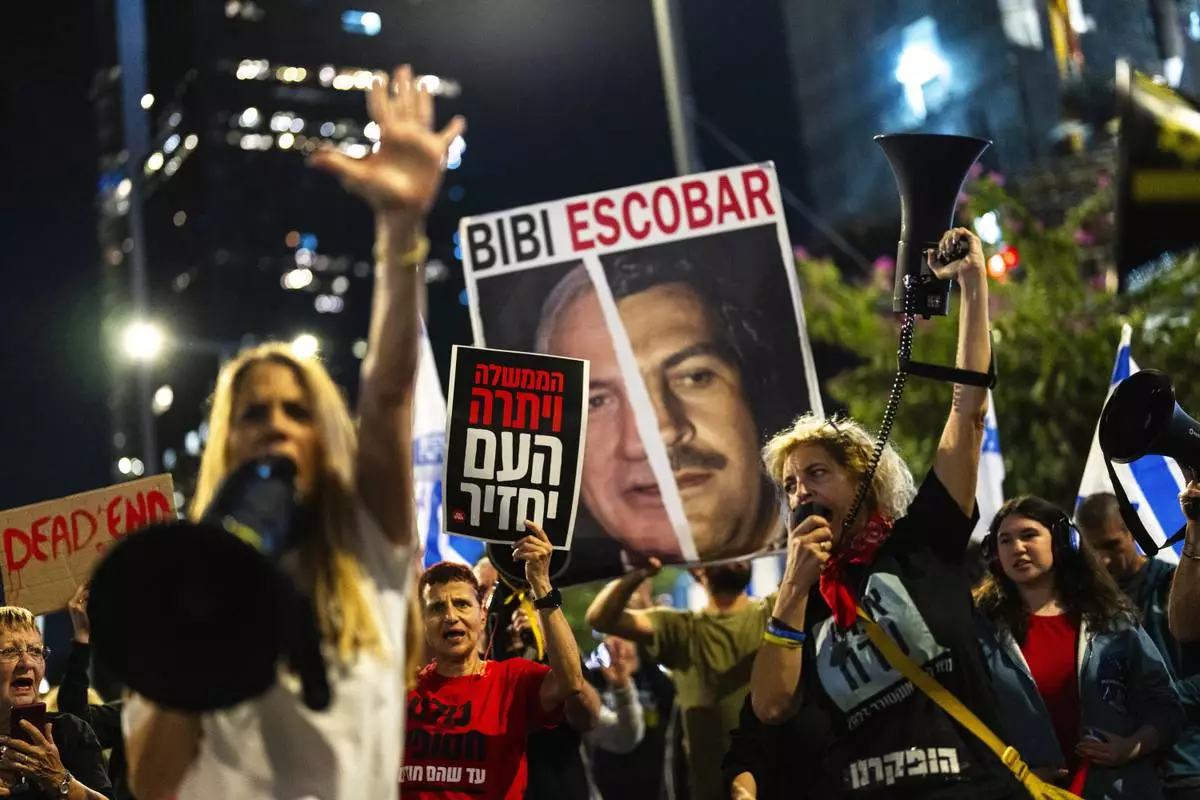
People shout slogans during a protest against Prime Minister Benjamin Netanyahu's government and call for the release of hostages held in the Gaza Strip by the Hamas militant group, in Tel Aviv, Israel, Saturday, Nov. 16, 2024. (AP Photo/Francisco Seco)
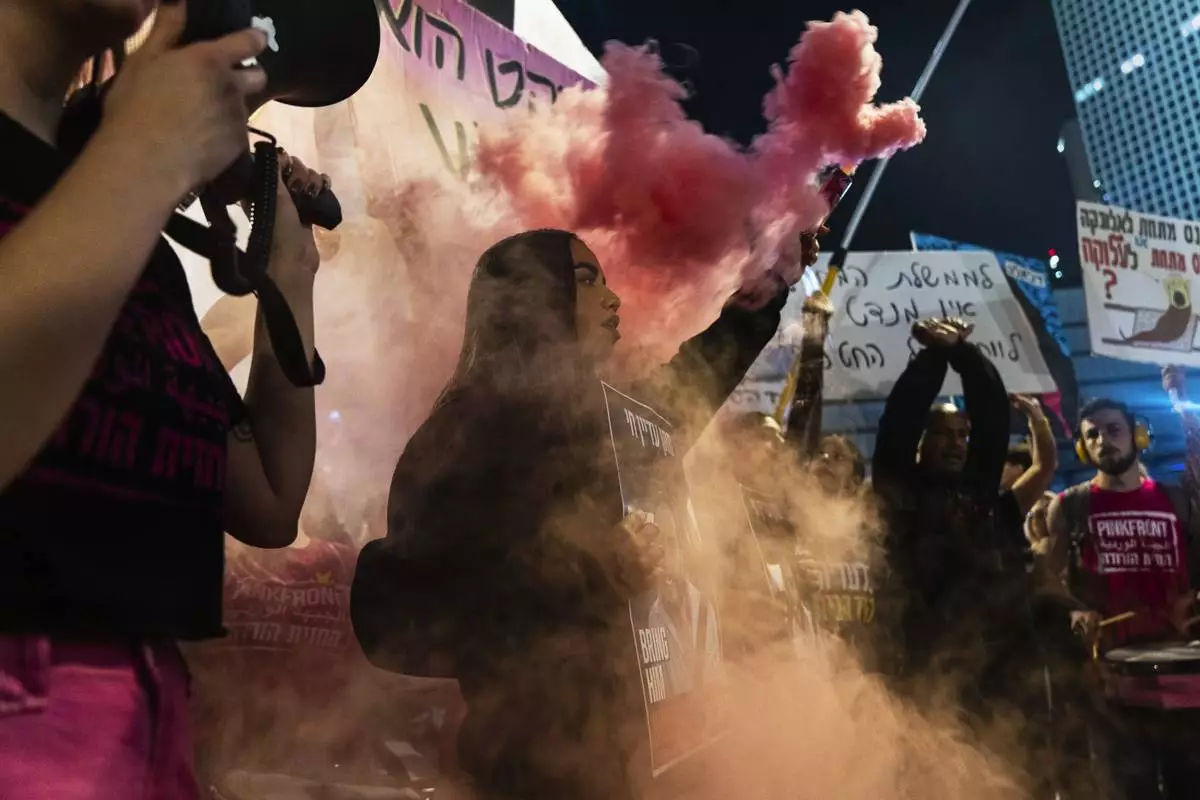
People shout slogans during a protest against Prime Minister Benjamin Netanyahu's government and call for the release of hostages held in the Gaza Strip by the Hamas militant group, in Tel Aviv, Israel, Saturday, Nov. 16, 2024. (AP Photo/Francisco Seco)
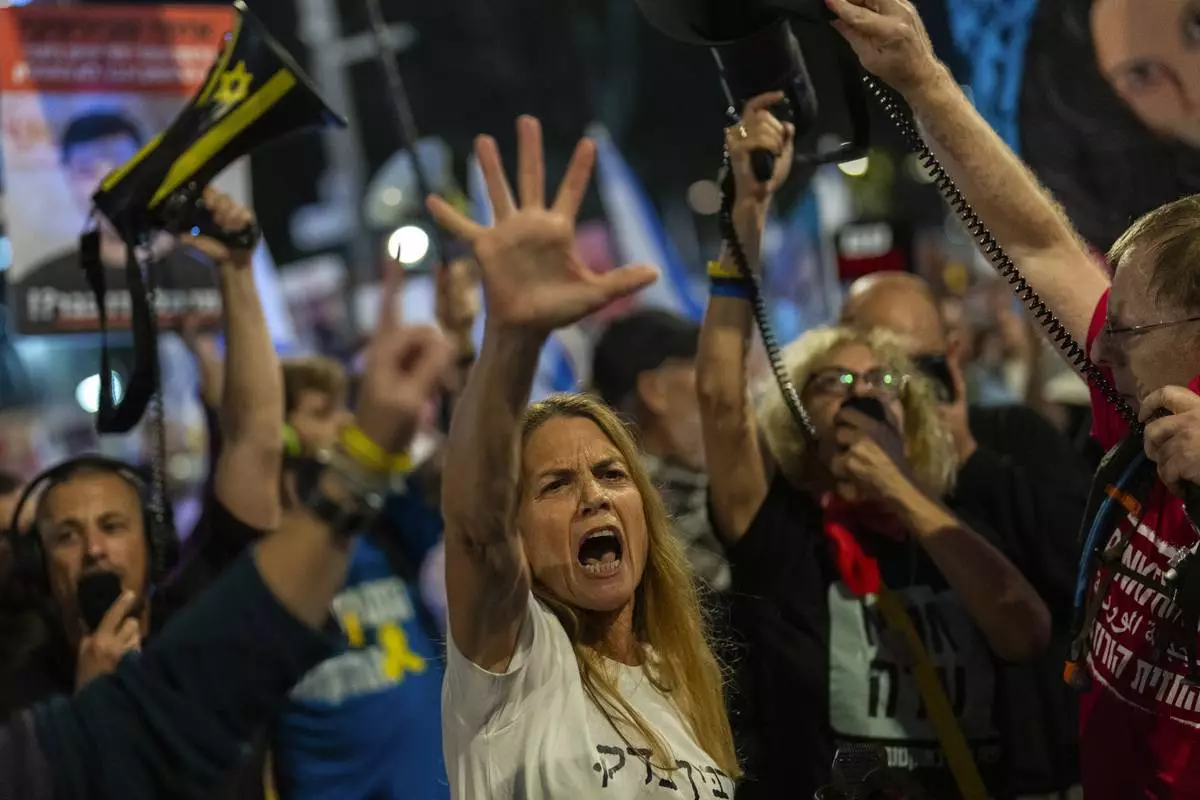
People shout slogans during a protest against Prime Minister Benjamin Netanyahu's government and call for the release of hostages held in the Gaza Strip by the Hamas militant group, in Tel Aviv, Israel, Saturday, Nov. 16, 2024. (AP Photo/Francisco Seco)
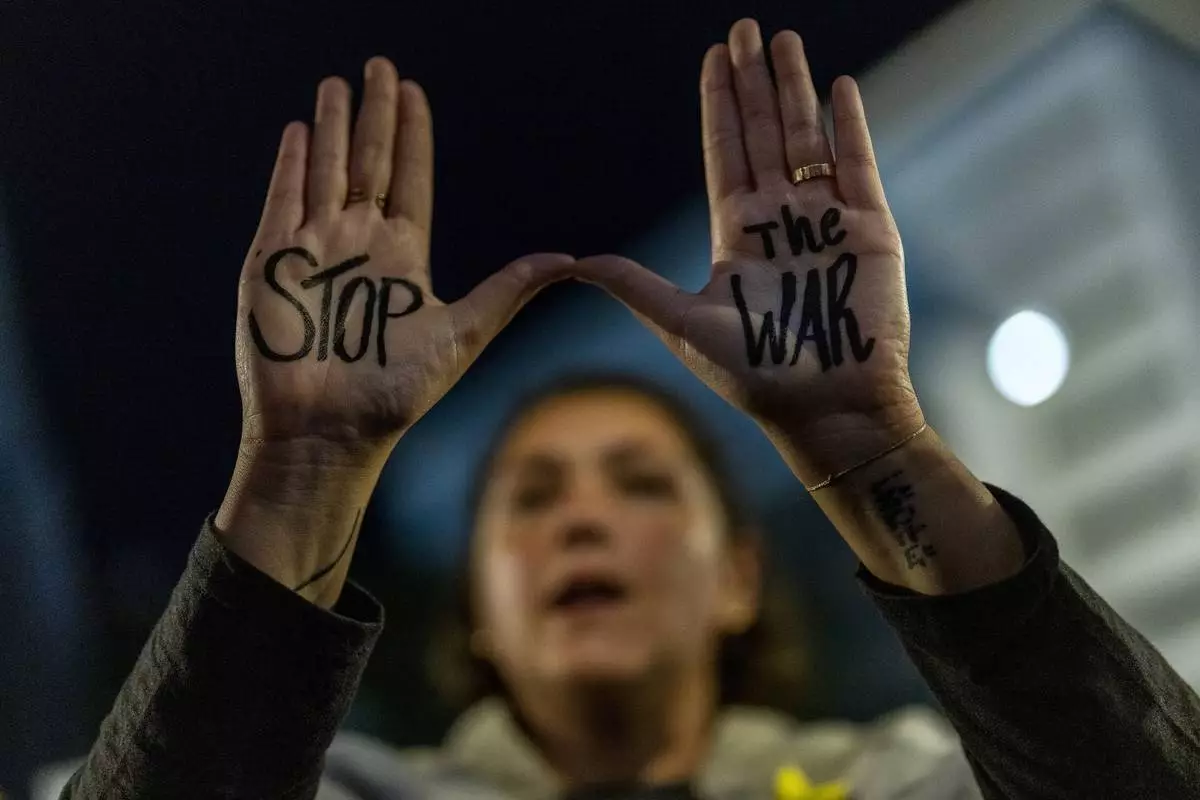
A woman shouts slogans during a protest against Prime Minister Benjamin Netanyahu's government and call for the release of hostages held in the Gaza Strip by the Hamas militant group, in Tel Aviv, Israel, Saturday, Nov. 16, 2024. (AP Photo/Francisco Seco)





